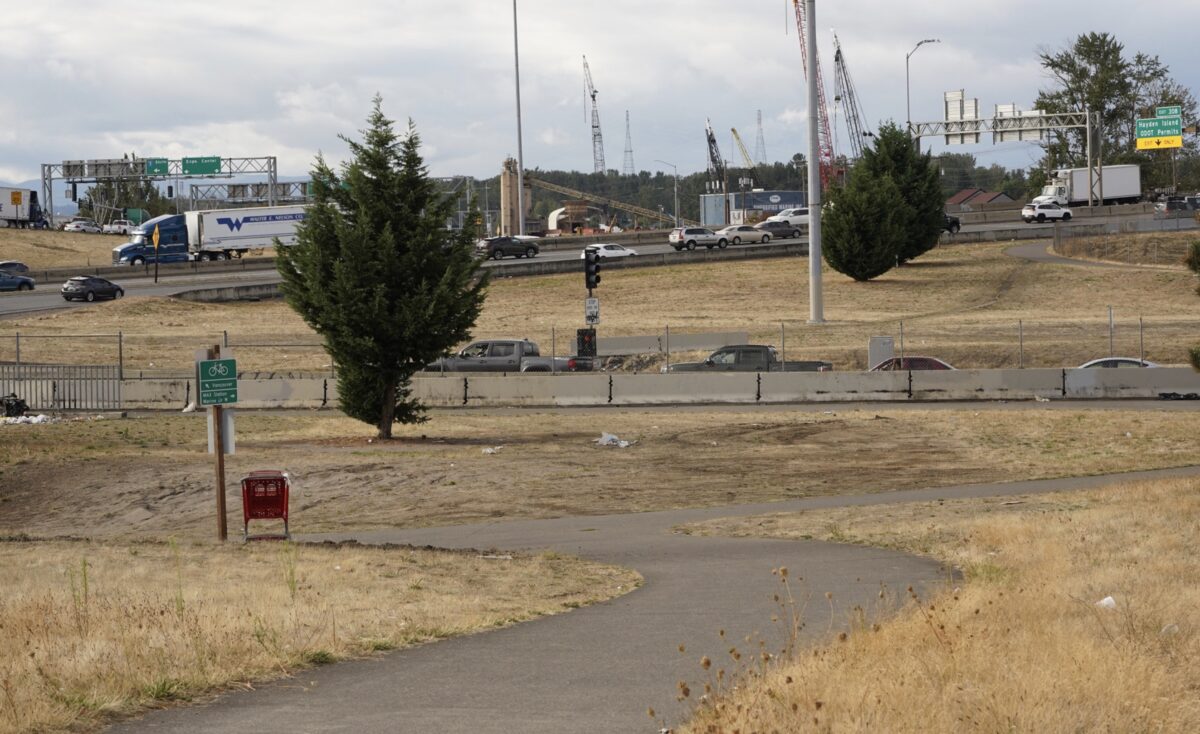
(Photo: Jonathan Maus/BikePortland)
When Interstate Bridge Replacement program administrator Greg Johnson was briefing the project’s equity advisory group earlier this week about the negotiations over a transportation package in Washington State, he told them the IBR was not “at the center” of those negotiations. By midweek, though, the highway project had been thrust directly into that center by several Oregon Republicans.
“If the majority party in Washington thought we would turn a blind eye when they force us to pay for their roads, they are mistaken.”
— Shelly Boshart Davis, Oregon House member (R-Albany)
The $16.8 billion, 16-year “Move Ahead Washington” transportation package currently working its way through the Washington legislature includes a number of new funding sources, including expected revenue over nearly two decades from the state’s new cap-and-invest climate law and a $2 billion transfer from the state’s general fund. It also includes a newly proposed 6 cent tax on exported fuel. That tax now has Republicans in Oregon threatening to walk away from the IBR’s negotiating table, joining a small chorus of voices from outside Washington pushing back on the proposal.
“If the majority party in Washington thought we would turn a blind eye when they force us to pay for their roads, they are mistaken,” Representative Boshart Davis (R-Albany) noted in a press release sent Wednesday titled “Republicans will walk away from Interstate Bridge Replacement program talks if Washington’s tax on Oregonians passes”. Boshart Davis also referred to the idea as “offensive” at a hearing for the bill last week. Senator Lynn Findley (R-Eastern Oregon) also quoted in the release, saying that “Republicans will not stand by and let Washington raise the cost-of-living for our residents without a fight.” Boshart Davis and Findley are among the only Oregon Republicans on the joint legislative committee that will ultimately sign off on the design of the highway expansion and bridge project.
Washington Democrats have defended the idea of a fuel export tax, calling it a way to capture funds to account for some of the negative impacts that come as a result of Washington’s five fuel refineries, which produce 90% of the fuel used in Oregon. Jake Fey, chair of the Washington House transportation committee, represents a district with one of those refineries. “We bear the brunt for the environmental impacts that are created by having the refineries here in the state,” he has said.
Advertisement
Perhaps multimodal transportation and environmental advocates would be happy to see Oregon Republicans make good on their threat to walk away from discussions around the IBR.
Whether the fuel tax is actually proposed to pay for projects that reduce the burden of those environmental impacts is up for debate. The transportation package invests more in transit, walking, and biking infrastructure than any other package in the state’s history, but that’s largely attributable to the cap-and-invest bill Democrats passed last year, which will raise over $5 billion over 16 years that by law must go toward projects that reduce transportation emissions. The other funding sources in the package, including the fuel tax, will go toward traditional highway projects: more maintenance and preservation funding than the state has seen in recent years, but also expansion projects like the IBR.
Paulo Nunes-Ueno, Transportation Lead for Front and Centered, a statewide coalition of communities of color-led groups, said of the package, “This is a step in the right direction. But this transportation package still sticks frontline communities with the bill for our addiction to oil and autos – a price we pay sometimes with our lives.” Climate action group 350 Seattle calculated the impact of the additional highway capacity via the induced demand calculator created by the Rocky Mountain Institute and says it could add up to 1 billion vehicle miles traveled per year.
Which is to say, perhaps multimodal transportation and environmental advocates would be happy to see Oregon Republicans make good on their threat to walk away from discussions around the IBR. So far, the fight against an IBR project that expands the highway for miles on each side of the border has largely taken place on the Oregon side, with many Portland-area advocacy orgs united in their desire to see a project that does not increase the number of lanes on I-5. Republicans on the Washington side are plenty unhappy about the export tax proposal as well, though we haven’t seen any threaten to walk away from the negotiating table of a project that most see as essential to accommodating growth in their districts.
Ultimately, without a transportation package in Washington, the project most likely is dead. A defeat of the overall package would be a complete repeat of what happened in 2013 with the cancellation of the Columbia River Crossing project. But here it looks much less likely, with Democrats in Washington all united behind the Move Ahead Washington proposal. On Wednesday, the senate transportation committee adopted an amendment to the biennial transportation budget allocating $200 million for the IBR project, with a stated intent that the legislature will ultimately chip in $1.2 billion. The project is almost certainly moving forward, with or without a few Oregon Republicans.

